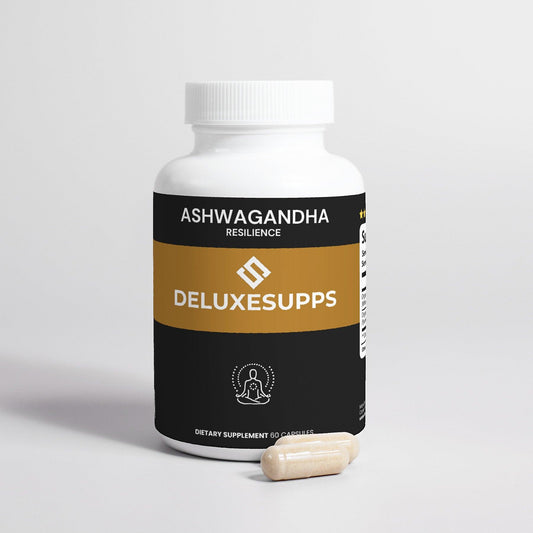
Used for centuries in Ayurvedic medicine, ashwagandha is gaining modern recognition for its adaptogenic properties helping the body cope with stress while supporting balanced energy and restful sleep. In this article, we’ll explore how ashwagandha works, what science says about its sleep-enhancing effects, and how to use it effectively.
In a world of constant stimulation, anxiety, and sleepless nights, many people are turning to natural remedies to improve their sleep quality. Among these, ashwagandha for sleep stands out as one of the most researched and trusted herbal solutions for calming the mind and promoting deep rest.
What is Ashwagandha?
Ashwagandha (Withania somnifera), also known as “Indian ginseng” or “winter cherry,” is an adaptogenic herb traditionally used to reduce stress, boost energy, and support overall wellness.
The term "somnifera" in its Latin name literally means “sleep-inducing,” reflecting one of its earliest recognized uses. Today, modern research is validating ashwagandha's benefits for both stress reduction and improved sleep quality.
How Ashwagandha Supports Better Sleep
Ashwagandha doesn't function as a sedative like melatonin or sleep aids. Instead, it targets the root causes of poor sleep: stress, anxiety, and hormonal imbalance.
Key Mechanisms:
- Reduces Cortisol: Ashwagandha helps lower cortisol, the body’s primary stress hormone. Elevated cortisol in the evening is a common cause of insomnia.
- Regulates the HPA Axis: It helps balance the hypothalamic-pituitary-adrenal axis, which plays a central role in sleep-wake cycles.
- Enhances GABA Activity: Compounds in ashwagandha may mimic the calming effects of GABA, a neurotransmitter that promotes relaxation.
What the Science Says
1. Reduced Stress and Anxiety
Multiple clinical studies support ashwagandha’s ability to reduce stress—an essential factor in sleep quality.
- A double-blind, placebo-controlled study published in Cureus showed that adults taking ashwagandha root extract experienced a 41% reduction in stress levels and improved sleep quality over 8 weeks source.
2. Improved Sleep Onset and Duration
- A 2020 randomized study published in the Journal of Ethnopharmacology found that participants with insomnia who took ashwagandha extract slept significantly longer and had faster sleep onset than those taking a placebo source.
3. Support for Shift Workers and Older Adults
Ashwagandha has also shown benefits in populations most vulnerable to sleep disturbances:
- Shift workers
- Elderly adults
- People with generalized anxiety disorder (GAD)
The same adaptogenic properties that make it helpful for managing stress also enhance sleep for those with disrupted circadian rhythms.
Ashwagandha vs. Other Natural Sleep Aids
| Supplement | Primary Function | Sedating? | Long-Term Use Safe? |
| Ashwagandha | Stress relief, hormone regulation | No | Yes |
| Melatonin | Regulates circadian rhythm | Yes | Not recommended long term |
| Valerian Root | Promotes sedation and relaxation | Yes | Yes, but may cause grogginess |
| Magnesium | Muscle relaxation, nervous system | No | Yes |
Ashwagandha for sleep is ideal for those who want natural support without morning grogginess or dependency risks.
Who Can Benefit from Ashwagandha?
You may benefit from using ashwagandha if you:
- Struggle with falling or staying asleep
- Experience high stress or anxiety at night
- Wake up tired even after 7–8 hours of sleep
- Work night shifts or irregular hours
- Want a non-sedative, long-term solution for better rest
How to Take Ashwagandha for Sleep
Ashwagandha is available in several forms: capsules, powders, and liquid extracts. For consistent and convenient dosing, capsules are the preferred option.
Recommended Dosage:
- 300–600 mg of a high-concentration root extract, taken daily
- Evening use is preferred for sleep benefits
For best results, use a standardized extract with 5% withanolides, the active compounds responsible for its adaptogenic effects.
We recommend DeluxeSupps Ashwagandha Herbal Supplement, which is third-party tested, non-GMO, and optimized for daily use and sleep support.
When to Take It
- Evening: Ideal for sleep benefits and cortisol reduction before bed
- With or after a meal: Increases absorption and minimizes digestive upset
- Daily use: Best results are seen after 4–8 weeks of consistent intake
What to Expect
Ashwagandha is not a knockout herb like melatonin. Its effects are cumulative. Here’s what most users report:
- Week 1–2: Subtle calming effects, improved mood
- Week 3–4: Quicker sleep onset, fewer night awakenings
- Week 5+: Deeper sleep, better recovery, reduced stress upon waking
Combining Ashwagandha with Other Sleep Support
Ashwagandha works well with other gentle, non-habit-forming supplements:
- Magnesium glycinate – for muscle relaxation
- L-theanine – to calm the mind without sedation
- CBD – for stress reduction and anti-inflammatory support
- Adaptogenic blends – including rhodiola, holy basil, and reishi
If you're building a nighttime routine, ashwagandha is a solid foundational herb to include.
Safety and Side Effects
Ashwagandha is well-tolerated by most people, but mild side effects can occur, including:
- Digestive discomfort
- Headache
- Drowsiness (when taken in high doses)
Avoid if you are:
- Pregnant or breastfeeding
- Taking sedatives, thyroid medication, or immunosuppressants (consult your doctor)
When in doubt, start with a low dose and monitor your body's response.
Frequently Asked Questions (FAQs)
How long before bed should I take ashwagandha?
Take it 30–60 minutes before bedtime to allow your body to absorb and respond to it. For those using it for general stress, morning or evening use is acceptable.
Will it make me feel drowsy during the day?
No. Ashwagandha is non-sedative. It supports sleep by regulating stress hormones, not by forcing sleepiness. Most users feel calmer but alert during the day.
Can I take ashwagandha long-term?
Yes, it’s safe for daily use over extended periods. Many people take it for several months to maintain balance in stress, sleep, and energy.
How is it different from melatonin?
Melatonin is a hormone that helps reset your circadian rhythm. Ashwagandha reduces stress and promotes deeper, more restorative sleep—without sedating you or altering your hormone cycle.
Final Thoughts: Sleep Better, Naturally
Getting enough restful sleep isn’t just about logging hours—it’s about quality. If stress, anxiety, or an overactive mind is standing in the way of your rest, ashwagandha for sleep offers a natural, non-habit-forming solution.
With its stress-reducing, hormone-balancing, and adaptogenic properties, ashwagandha supports the root cause of poor sleep, not just the symptoms.
Ready to Sleep Smarter?
Experience better rest with DeluxeSupps Ashwagandha Herbal Supplement—a premium, clinically supported formula to help you manage stress and sleep soundly.












